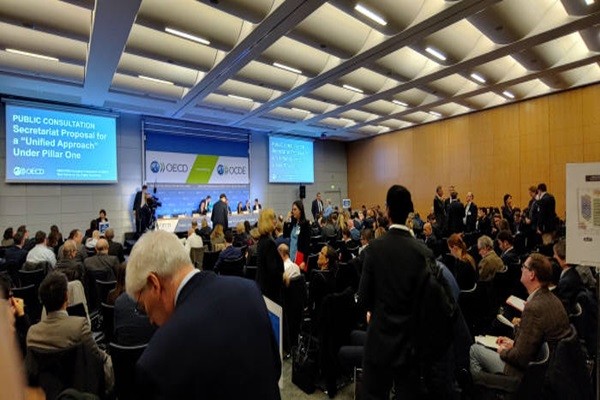There is an increased possibility that manufacturing industries will have to start paying digital taxes. The U.S. has clearly gained the leadership of discussions regarding digital tax while there are about 50 days before an agreement on digital tax must be reached. Discussion by OECD (Organisation for Economic Co-operation and Development) will officially end with a meeting between members of OECD and G20 that is scheduled to be held on the 29th and the 30th of January of 2020. . Agreement will reach a conclusion with unanimous agreement from members of OECD. OECD is planning to levy digital tax starting from June of 2020.
According to South Korea’s accounting industry, OECD held a meeting with digital tax as the main agenda in Paris on the 21st and the 22nd. The meeting was mainly about ‘Profit Split Method’ that is the main method for dividing digital tax per country. There were intense arguments over a plan that includes manufacturing businesses within the range of digital tax.
450 people such as representatives from IT and manufacturing companies, government representatives from major countries, and legal and accounting experts attended the meeting that was practically led by the U.S. Most of participants agreed with a draft on digital tax based on the U.S. Government’s opinions. PwC, Deloitte, KPMG, and EY, which are seen as the ‘Big Four’ accounting organizations, showed support on the draft Facebook, Netflix, Unilever, and Booking.com also showed support. Google and Uber left the meeting without expressing their stance on the draft.
Arguments from the opposing camp were weak. Huawei had observed the meeting without mentioning anything. While an alliance of European telecommunications companies opposed the draft by saying that it is difficult to distribute tax revenues due to practical affairs, it could not come up with any other argument to bring the leadership from the U.S. EU (European Union) also exited the meeting without throwing a ‘pick-off throw’. Although an alliance of Japanese companies also stood on the opposite side, it was looking for things that would benefit the country rather than arguing with the U.S. Japan dove into one of Profit Split Method’s characteristics where standard on income distribution can be different based on a country. It made a request to OECD about having it secure at least 15% of operating profits of multinational companies that are counted as parent companies as taxable income.
Only South Korean side had made sharp arguments. Han Sung-soo, who is an attorney from Law Firm Yangjae, demanded that an attempt to having manufacturing businesses to pay digital tax needs to be stopped and he also pointed out that Profit Split Method is a measure without any practicality. “All issues can be easily solved by seeing countries where business activities continue to take place and actively take place as fixed digital establishments and impose taxes just like manufacturing businesses.” said Han Sung-soo while standing in front of participants as a speaker. “OECD needs to lay out a policy that aims to bring benefits for all countries rather than particular countries.”

Arguments from manufacturing businesses were also not strong. It is heard that although an alliance of American manufacturing companies, an alliance of European manufacturing companies, and an alliance of oil companies formed an opposite line, there presence was nowhere to be found. “OECD only emphasized its plan to draw up an agreement bill and implement it as soon as possible.” said Lim Jae-kwang who is an accountant and was present at the meeting. “Manufacturing companies will pay dearly if they take this situation lightly.”
Profit Split Method is largely divided into two steps. First, it calculates sales that a multinational digital company earned in every country through consolidated financial statements. Then, ‘general earning’ that was earned through marketing, R&D, and business activities is subtracted from the total amount of sales. Rest of the amount is seen as ‘excess earning’ earned through intangible assets. Because it is difficult to calculate the amount of profits earned through intangible assets, Profit Split Method comes up with the amount by subtracting general earning from total sales.
Regarding excess earning, OECD has allowed countries where foreign subsidiaries and affiliated companies of multinational companies are located authorities to share authorities to impose taxes. However, some are concerned about abuse of power between countries during this process. Depending on the result of an agreement, it is inevitable that South Korea will face reduction in tax revenue. Because digital tax is designed more favorable for large markets such as the U.S. to secure tax revenues. This is the reason why President Trump has included manufacturing businesses within the range of digital tax.
Staff Reporter Choi, Jonghee | choijh@etnews.com